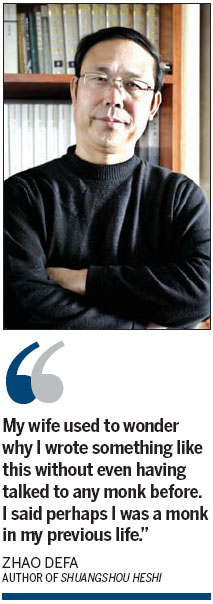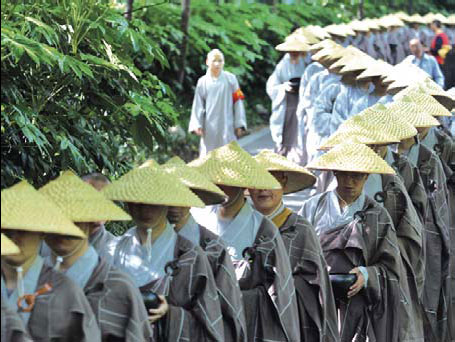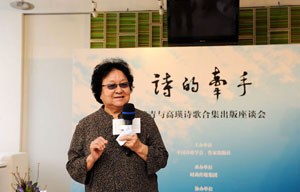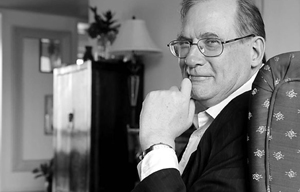Chance leads to a divine new path
By Han Bingbin ( China Daily ) Updated: 2013-10-08 11:07:23
|
Lingyin Temple, one of the country's largest Buddhist temples in Hangzhou, hosts a charity ritual drawing monks from home and abroad. |
"In my book, there are also portraits of those who try to make a fortune using Buddhism, a sign of how social transformation has caused disturbance within religion. The meaning of life is being questioned in both the monks' and the laymen's world."
Literature critic He Shaojun says the book, even though with a new theme, has actually carried on Zhao's constant reflections on moral principles in social changes by exploring how Buddhist culture interacts with modern ethics.
Beijing Normal University's Chinese literature professor Zhang Qinghua says just like how Zhao acutely detected the disappearing of land and rural civilization during industrialization, the author has again demonstrated his admirable sensitivity to social and cultural changes.
Zhao says there's part of himself in Huiyu: brought up under Confucius principles, being through a lot of suffering but still unwilling to associate himself with undesirable social trends.
His childhood and teenage years were constantly haunted by poverty, hunger and disease. He says he now still remembers which tree leaves and grass tasted better as they used to be his staple food.

The decades of pain from skin allergy was unbearable, only relieved when the poor little music fan practiced fingering on a fake flute made of willow branch.
As the oldest son, he started to shoulder the family burden by working in the fields at age 14.
But unlike Huiyu, who as Zhao wrote, followed the Buddhism doctrines to let go of his desires and miseries, the way Zhao dealt with his own challenges was an aggressive one.
"I can't go back. I must run forward. I want to leave the countryside and get away from poverty," he recalls.
While working as a private school teacher at 15, he started preparing himself for a better future by reading extensively.
At 23, he embraced a key change in his life after passing an examination to become a State-sponsored public school teacher, shortly before he was promoted to be a local official.
Since then, he has enjoyed speedy promotion in his official career. By 30, he was already the deputy director at a county-level organization.
But he was brave enough to give up what he had, driven by what he calls his "ghostly obsession with writing".
Ranking No 2 at the entrance examination, he successfully enrolled in the writer's workshop at Shandong University, only to find his dream an impractical one as his contributions to various publications were all returned in the first year.
Once again he indulged himself in extensive reading and more importantly, his memories of countryside life where he found the theme for his first novelette, about the wives of northern communist officials who remarried after they were encouraged to go to the south in the late 1940s.
The story won him a national literature award and launched a successful writing career.
Given what he has achieved today, the interesting question people often throw at Zhao is this: If he had met Buddhism much earlier in his life when he still suffered enormously, would he have converted?
"It's hard to say. Even after learning so much about Buddhism, I'm not converted. I understand some of the teachings. But for some others I don't fully understand and accept. I studied it as a cultural phenomenon," he says.
"Huiyu is of course an ideal character. I am still very much a secular person in real life.
"My wife used to wonder why I wrote something like this without even having
talked to any monk before. I said perhaps I was a monk in my previous life."
| An essential expedition |
|
|
|
|
|
|
|
|
























 Raymond Zhou:
Raymond Zhou: Pauline D Loh:
Pauline D Loh: Hot Pot
Hot Pot Eco China
Eco China China Dream
China Dream China Face
China Face





